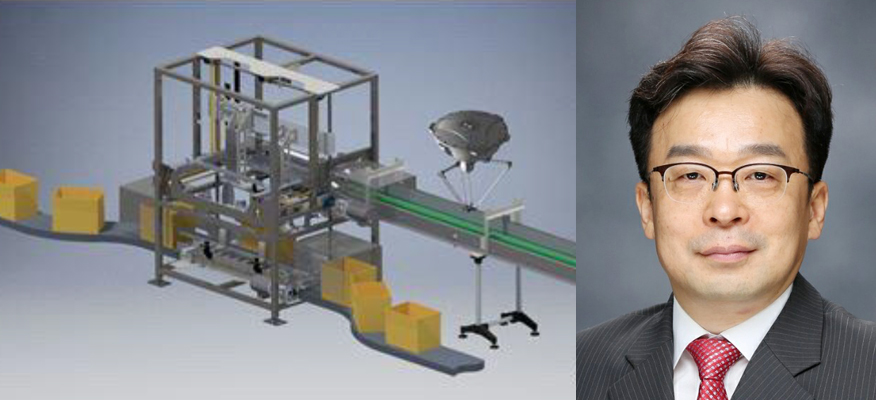커뮤니티
부경투데이
- 국립 부경대학교의 다양한 모습과 소식을 접하시면 부경대학교가 한번 더 가까워집니다.
| 수산업에 인공지능·로봇 융합 나섰다(Promoting for convergence of AI and robots in fisheries sector) | |||
| 작성자 | 대외협력과 | 작성일 | 2021-06-01 |
| 조회수 | 439 | ||
| 수산업에 인공지능·로봇 융합 나섰다(Promoting for convergence of AI and robots in fisheries sector) | |||||
 |
대외협력과 |  |
2021-06-01 |  |
439 |
AI·로봇 이용한 김·굴·어묵 생산 자동화 시스템 개발한다
- 부경대 연구 컨소시엄, 해수부 121억 기술개발사업 선정

전통적인 노동집약산업인 수산식품 가공 분야에 인공지능(AI)과 로봇 등을 적용하는 스마트 자동화 생산 시스템 개발이 추진된다.
부산 국립부경대학교를 중심으로 한 연구 컨소시엄(책임교수 서진호·기계시스템공학과)이 해양수산부의 2021년도 수산물 신선유통 스마트 기술개발사업에 선정됐다.
컨소시엄은 이번 사업의 ‘수산식품 스마트가공 기술개발’ 과제에 선정, 2025년까지 5년간 121억 원을 지원받아 연구개발에 나선다.
이 컨소시엄은 주관기관인 부경대를 비롯, 국립수산과학원, 한국로봇융합연구원, 한국해양과학기술원, ㈜현전사, ㈜경한, 열린정보시스템㈜, ㈜비케이인스트루먼트, 전북대 등 대학과 연구원, 공급기업 및 개발품목별 수요기업들이 공동연구기관으로 참여하는 대규모 연구단이다. 특히 개발품목별 수요기업들이 직접 참여해 개발결과물에 대한 현장실증실험을 공동 진행함으로써 전략적으로 상용화시스템을 개발할 예정이다.
이번 연구과제의 목표는 수산물, 그 중에서도 김과 굴, 어묵을 대상으로 △전처리, 선별, 가공, 포장 등 생산핵심공정 자동화 시스템 △지능정보 기반 데이터 관리 및 스마트 검사 시스템 △자율인지형 스마트 공정제어 시스템을 개발하는 것이다.
지금까지 수산물의 전처리, 제조 단계에서 노동자의 숙련도에 의존했다면, 이번 연구를 통해 비정형적인 원료 데이터를 비롯해 노하우 데이터, 품질 데이터를 활용해 원료 이동과 혼합 비율을 결정하는 시스템을 개발하고 자동화 시스템을 적용할 수 있게 된다.
이와 함께 검사 단계에서는 AI 기술을 활용, 품질 검사 알고리즘과 고속 공정 품질검사센서 기술, 제품별 최적 데이터관리 및 품질검사 플랫폼 기술을 개발할 계획이다. 이에 따라 수산물의 이물질은 물론, 최근 우려가 커지고 있는 방사능 오염도 실시간으로 검사할 수 있는 시스템이 개발될 전망이다.
여기에 포장, 선별 단계에는 로봇과 IoT 기술을 활용해 김, 굴, 어묵 등 품목별 포장 자동화 공정기술과 중량별 트레이 최적 이동 궤적 알고리즘, 분류 및 포장 자동화 기술 등에 기반을 둔 스마트 공정 시스템을 개발, 적용할 계획이다.
연구책임자인 부경대 서진호 교수(기계시스템공학과)는 “수산업이 국가와 지역의 미래 먹거리를 책임질 핵심 대안으로 떠오르고 있지만, 어업인구 감소와 고령화 등으로 지속가능성 확보가 시급하다. 이번 연구과제로 핵심 기술 개발은 물론, 기술 상용화와 사업화를 통해 수산업이 미래 첨단사업으로 도약할 수 있도록 최선을 다하겠다.”라고 말했다. <부경투데이>
Developing an automated system for the production of seaweed, oysters, and fish cakes using AI and robots
- The research consortium of PKNU, selected as a partner for the 12.1 billion won technology development project of the MOF
The development of a smart automated production system that applies artificial intelligence (AI) and robots to the field of seafood processing, which is traditionally a labor-intensive industry, will be actively promoted.
A research consortium (Chief Prof. Suh Jin-Ho, Mechanical System Engineering) centered on Pukyong National University in Busan has been selected for a smart technology development project for the distribution of fresh marine products in 2021 by the Ministry of Oceans and Fisheries (MOF).
The research consortium will be selected for the 'Development Project of Smart Processing Technology for Marine products' and will receive 12.1 billion won in support for five years until 2025 to begin R&D.
This consortium is a large-scale research group of researchers, suppliers, and consumer companies. Universities such as Pukyong National University and Chonbuk National University, as well as the National Fisheries Research & Development Institute, Korea Institute of Robotics & Technology Convergence (KIRO), Korea Institute of Ocean Science & Technology (KIOST), HyunJeon Co., Ltd, KyungHan Co., Ltd, OPENIN, and BK Instruments Inc., participate as joint research institutes. Particularly, they are planning to develop a strategic commercialization system by directly participating in the project by demanding companies according to each development item and jointly conducting empirical field experiments on the development results.
The goal of this research project is to develop an automation system for production core processes such as pretreatment, selection, processing, and packaging for marine products; an intelligent information-based data management and smart inspection system; and an autonomous recognition smart process control system, especially for seaweed, oysters, and fish cakes.
Previously, the pre-processing and manufacturing stages of seafood depended on the skill level of the workers, but through this research, it is possible to develop a system that determines the movement and mixing ratio of raw materials and apply an automated system by using atypical raw material data, a knowhow database, and quality data screening.
At the same time, in the inspection stage, AI technology is used to develop quality inspection algorithms, quality inspection sensor technology is utilized for high-speed processes, and optimal data management and quality inspection platform technology is used for each product. Accordingly, it is expected that a system will be developed that can inspect not only foreign substances in seafood but also radioactive contamination in real-time, which is a recent growing concern.
In addition, in the packaging and sorting stage, a smart process system based on packaging automation process technology for each item, such as laver, oysters, and fish cake, and the optimal movement trajectory algorithm for trays by weight, classification, and packaging automation technology will be applied using robots and IoT technology.
Professor Suh Jin-Ho (Dept. of Mechanical System Engineering) of Pukyong National University, who is in charge of the research, said, "Although the fishery industry is emerging as a key alternative that will take responsibility for the future food of the country and region, it is urgent to secure sustainability due to a decrease and aging in the population of fishing workers. With this research project, I will do my best so that the fishery industry can leap forward as a future high-tech business through technology commercialization and commercialization as well as core technology development." <Pukyong Today>